Leadership Report: Theories, Challenges, and Effective Leadership
VerifiedAdded on 2023/01/13
|18
|4800
|77
Report
AI Summary
This report provides an in-depth analysis of leadership, focusing on its importance in modern organizations. It explores various leadership theories, models, and the concept of effective leadership, drawing on the work of multiple authors. The report identifies the challenges that leaders face, including managing new initiatives, dealing with transitions, and navigating tough economic times, as well as opposition from powerful forces. It highlights essential qualities of great leaders, such as enthusiasm, honesty, and communication skills. The report emphasizes the significance of leadership in achieving organizational goals and maximizing efficiency. The assignment is a critical literature review, based on the provided brief, exploring key debates, differences in opinion, approaches, and findings from published work within Organisational Behaviour (OB) and Human Resource Management (HRM).
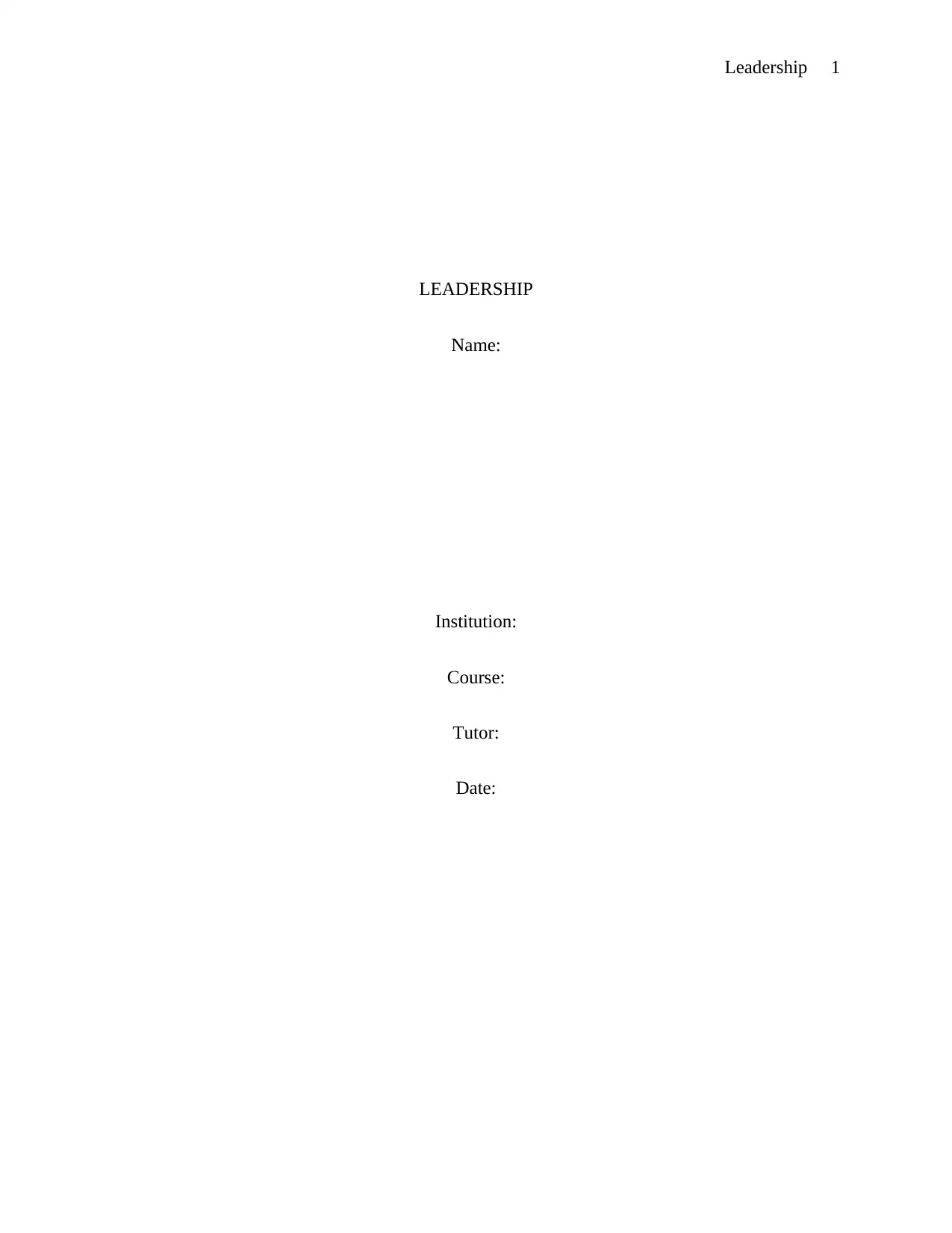
Leadership 1
LEADERSHIP
Name:
Institution:
Course:
Tutor:
Date:
LEADERSHIP
Name:
Institution:
Course:
Tutor:
Date:
Paraphrase This Document
Need a fresh take? Get an instant paraphrase of this document with our AI Paraphraser
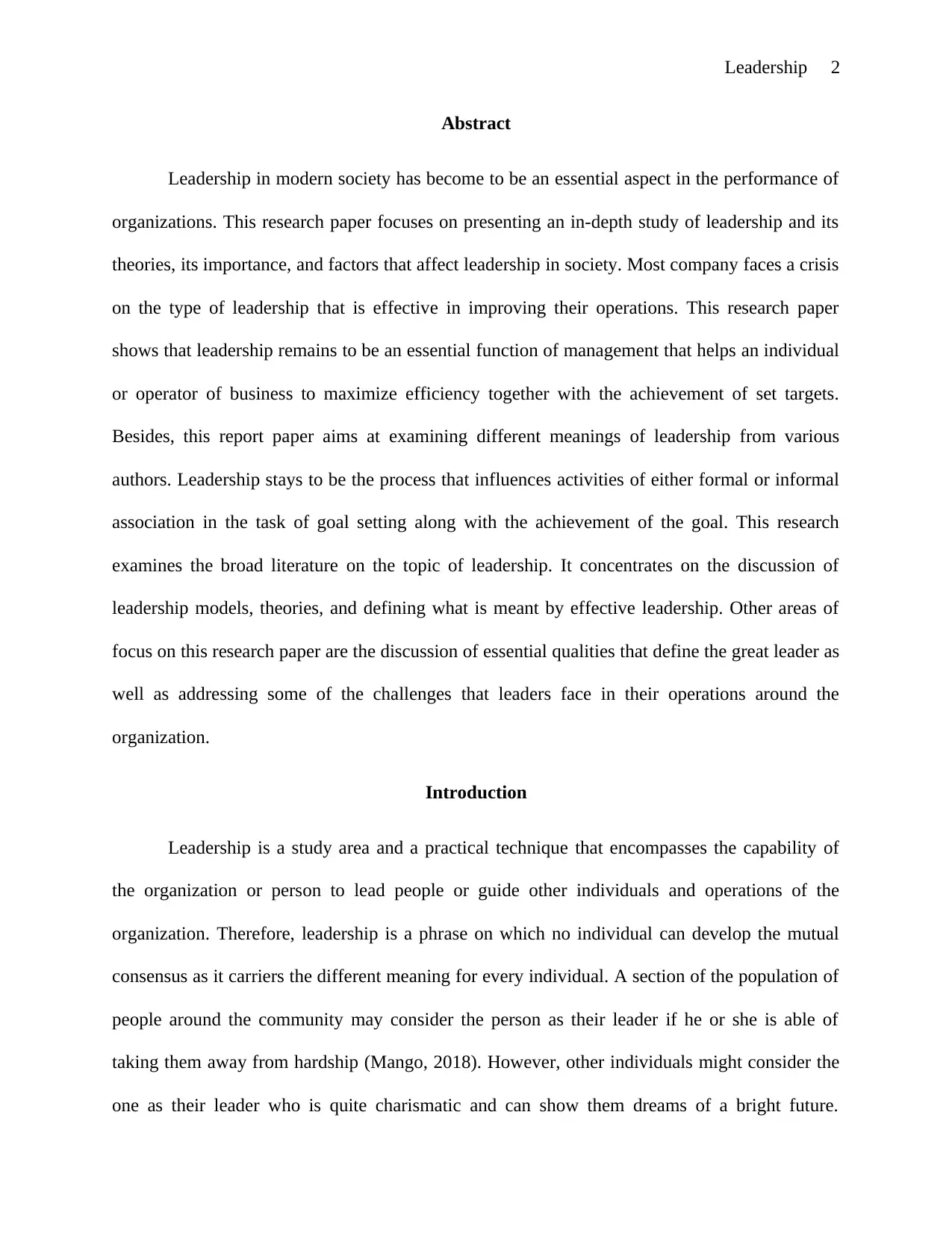
Leadership 2
Abstract
Leadership in modern society has become to be an essential aspect in the performance of
organizations. This research paper focuses on presenting an in-depth study of leadership and its
theories, its importance, and factors that affect leadership in society. Most company faces a crisis
on the type of leadership that is effective in improving their operations. This research paper
shows that leadership remains to be an essential function of management that helps an individual
or operator of business to maximize efficiency together with the achievement of set targets.
Besides, this report paper aims at examining different meanings of leadership from various
authors. Leadership stays to be the process that influences activities of either formal or informal
association in the task of goal setting along with the achievement of the goal. This research
examines the broad literature on the topic of leadership. It concentrates on the discussion of
leadership models, theories, and defining what is meant by effective leadership. Other areas of
focus on this research paper are the discussion of essential qualities that define the great leader as
well as addressing some of the challenges that leaders face in their operations around the
organization.
Introduction
Leadership is a study area and a practical technique that encompasses the capability of
the organization or person to lead people or guide other individuals and operations of the
organization. Therefore, leadership is a phrase on which no individual can develop the mutual
consensus as it carriers the different meaning for every individual. A section of the population of
people around the community may consider the person as their leader if he or she is able of
taking them away from hardship (Mango, 2018). However, other individuals might consider the
one as their leader who is quite charismatic and can show them dreams of a bright future.
Abstract
Leadership in modern society has become to be an essential aspect in the performance of
organizations. This research paper focuses on presenting an in-depth study of leadership and its
theories, its importance, and factors that affect leadership in society. Most company faces a crisis
on the type of leadership that is effective in improving their operations. This research paper
shows that leadership remains to be an essential function of management that helps an individual
or operator of business to maximize efficiency together with the achievement of set targets.
Besides, this report paper aims at examining different meanings of leadership from various
authors. Leadership stays to be the process that influences activities of either formal or informal
association in the task of goal setting along with the achievement of the goal. This research
examines the broad literature on the topic of leadership. It concentrates on the discussion of
leadership models, theories, and defining what is meant by effective leadership. Other areas of
focus on this research paper are the discussion of essential qualities that define the great leader as
well as addressing some of the challenges that leaders face in their operations around the
organization.
Introduction
Leadership is a study area and a practical technique that encompasses the capability of
the organization or person to lead people or guide other individuals and operations of the
organization. Therefore, leadership is a phrase on which no individual can develop the mutual
consensus as it carriers the different meaning for every individual. A section of the population of
people around the community may consider the person as their leader if he or she is able of
taking them away from hardship (Mango, 2018). However, other individuals might consider the
one as their leader who is quite charismatic and can show them dreams of a bright future.
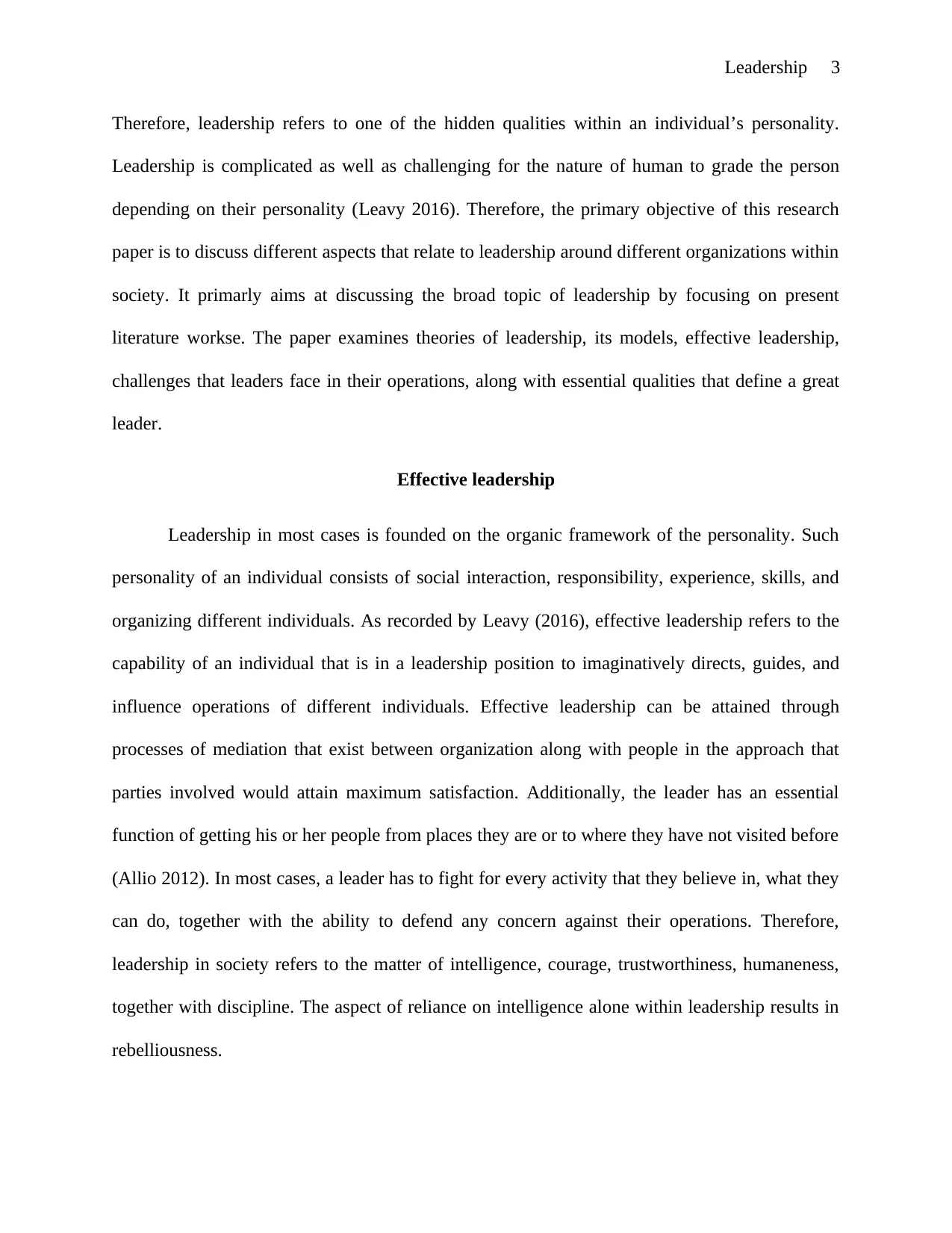
Leadership 3
Therefore, leadership refers to one of the hidden qualities within an individual’s personality.
Leadership is complicated as well as challenging for the nature of human to grade the person
depending on their personality (Leavy 2016). Therefore, the primary objective of this research
paper is to discuss different aspects that relate to leadership around different organizations within
society. It primarly aims at discussing the broad topic of leadership by focusing on present
literature workse. The paper examines theories of leadership, its models, effective leadership,
challenges that leaders face in their operations, along with essential qualities that define a great
leader.
Effective leadership
Leadership in most cases is founded on the organic framework of the personality. Such
personality of an individual consists of social interaction, responsibility, experience, skills, and
organizing different individuals. As recorded by Leavy (2016), effective leadership refers to the
capability of an individual that is in a leadership position to imaginatively directs, guides, and
influence operations of different individuals. Effective leadership can be attained through
processes of mediation that exist between organization along with people in the approach that
parties involved would attain maximum satisfaction. Additionally, the leader has an essential
function of getting his or her people from places they are or to where they have not visited before
(Allio 2012). In most cases, a leader has to fight for every activity that they believe in, what they
can do, together with the ability to defend any concern against their operations. Therefore,
leadership in society refers to the matter of intelligence, courage, trustworthiness, humaneness,
together with discipline. The aspect of reliance on intelligence alone within leadership results in
rebelliousness.
Therefore, leadership refers to one of the hidden qualities within an individual’s personality.
Leadership is complicated as well as challenging for the nature of human to grade the person
depending on their personality (Leavy 2016). Therefore, the primary objective of this research
paper is to discuss different aspects that relate to leadership around different organizations within
society. It primarly aims at discussing the broad topic of leadership by focusing on present
literature workse. The paper examines theories of leadership, its models, effective leadership,
challenges that leaders face in their operations, along with essential qualities that define a great
leader.
Effective leadership
Leadership in most cases is founded on the organic framework of the personality. Such
personality of an individual consists of social interaction, responsibility, experience, skills, and
organizing different individuals. As recorded by Leavy (2016), effective leadership refers to the
capability of an individual that is in a leadership position to imaginatively directs, guides, and
influence operations of different individuals. Effective leadership can be attained through
processes of mediation that exist between organization along with people in the approach that
parties involved would attain maximum satisfaction. Additionally, the leader has an essential
function of getting his or her people from places they are or to where they have not visited before
(Allio 2012). In most cases, a leader has to fight for every activity that they believe in, what they
can do, together with the ability to defend any concern against their operations. Therefore,
leadership in society refers to the matter of intelligence, courage, trustworthiness, humaneness,
together with discipline. The aspect of reliance on intelligence alone within leadership results in
rebelliousness.
⊘ This is a preview!⊘
Do you want full access?
Subscribe today to unlock all pages.

Trusted by 1+ million students worldwide
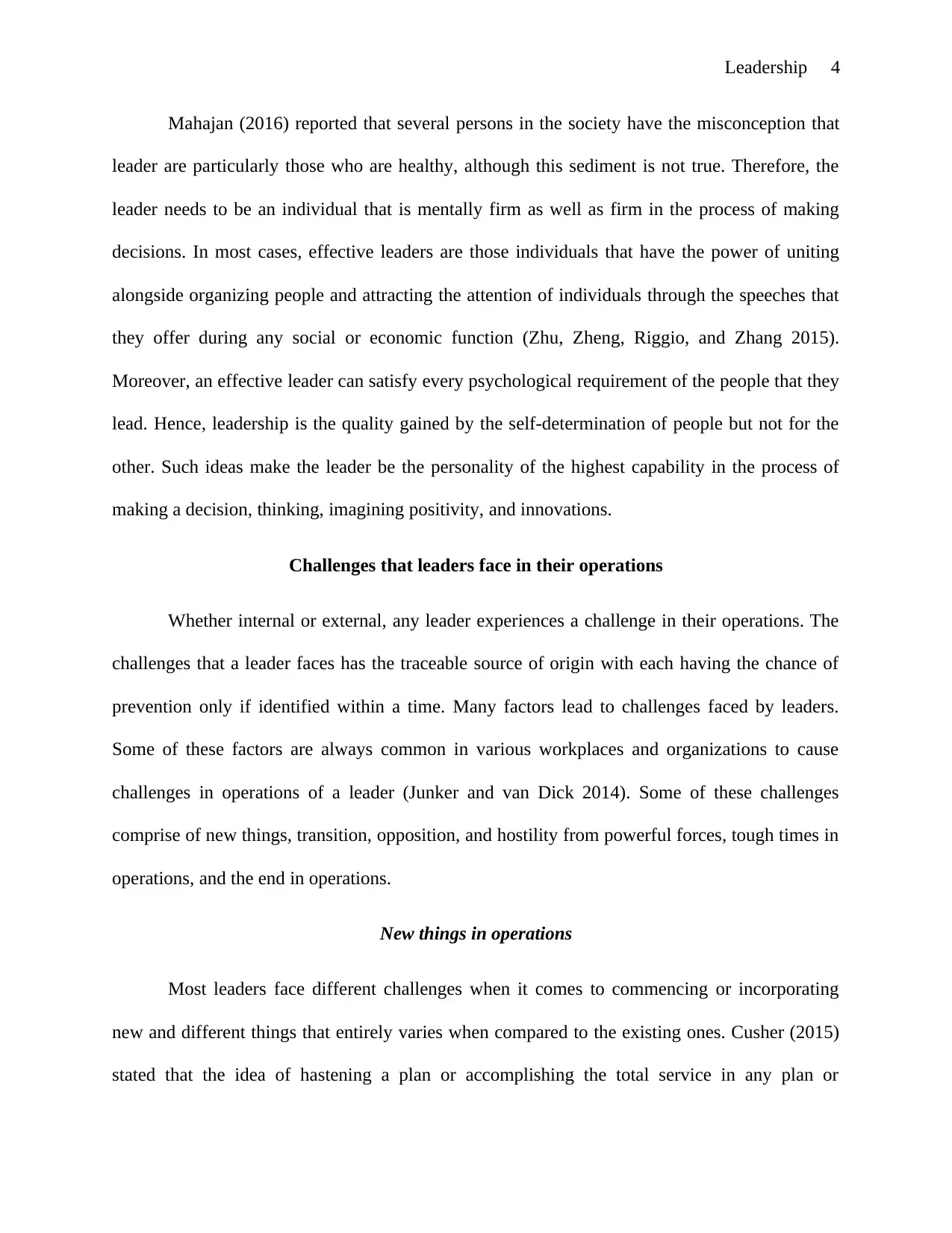
Leadership 4
Mahajan (2016) reported that several persons in the society have the misconception that
leader are particularly those who are healthy, although this sediment is not true. Therefore, the
leader needs to be an individual that is mentally firm as well as firm in the process of making
decisions. In most cases, effective leaders are those individuals that have the power of uniting
alongside organizing people and attracting the attention of individuals through the speeches that
they offer during any social or economic function (Zhu, Zheng, Riggio, and Zhang 2015).
Moreover, an effective leader can satisfy every psychological requirement of the people that they
lead. Hence, leadership is the quality gained by the self-determination of people but not for the
other. Such ideas make the leader be the personality of the highest capability in the process of
making a decision, thinking, imagining positivity, and innovations.
Challenges that leaders face in their operations
Whether internal or external, any leader experiences a challenge in their operations. The
challenges that a leader faces has the traceable source of origin with each having the chance of
prevention only if identified within a time. Many factors lead to challenges faced by leaders.
Some of these factors are always common in various workplaces and organizations to cause
challenges in operations of a leader (Junker and van Dick 2014). Some of these challenges
comprise of new things, transition, opposition, and hostility from powerful forces, tough times in
operations, and the end in operations.
New things in operations
Most leaders face different challenges when it comes to commencing or incorporating
new and different things that entirely varies when compared to the existing ones. Cusher (2015)
stated that the idea of hastening a plan or accomplishing the total service in any plan or
Mahajan (2016) reported that several persons in the society have the misconception that
leader are particularly those who are healthy, although this sediment is not true. Therefore, the
leader needs to be an individual that is mentally firm as well as firm in the process of making
decisions. In most cases, effective leaders are those individuals that have the power of uniting
alongside organizing people and attracting the attention of individuals through the speeches that
they offer during any social or economic function (Zhu, Zheng, Riggio, and Zhang 2015).
Moreover, an effective leader can satisfy every psychological requirement of the people that they
lead. Hence, leadership is the quality gained by the self-determination of people but not for the
other. Such ideas make the leader be the personality of the highest capability in the process of
making a decision, thinking, imagining positivity, and innovations.
Challenges that leaders face in their operations
Whether internal or external, any leader experiences a challenge in their operations. The
challenges that a leader faces has the traceable source of origin with each having the chance of
prevention only if identified within a time. Many factors lead to challenges faced by leaders.
Some of these factors are always common in various workplaces and organizations to cause
challenges in operations of a leader (Junker and van Dick 2014). Some of these challenges
comprise of new things, transition, opposition, and hostility from powerful forces, tough times in
operations, and the end in operations.
New things in operations
Most leaders face different challenges when it comes to commencing or incorporating
new and different things that entirely varies when compared to the existing ones. Cusher (2015)
stated that the idea of hastening a plan or accomplishing the total service in any plan or
Paraphrase This Document
Need a fresh take? Get an instant paraphrase of this document with our AI Paraphraser
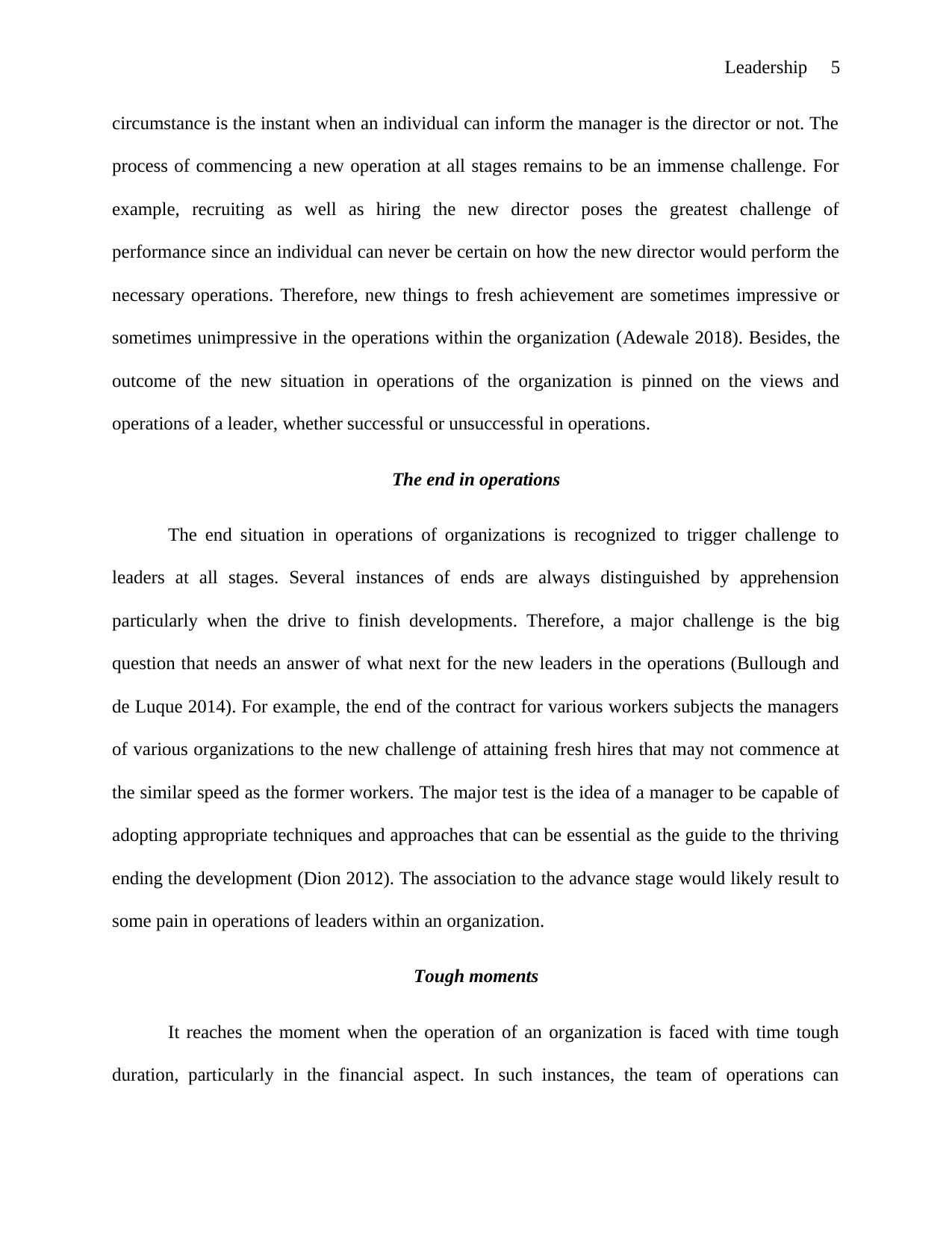
Leadership 5
circumstance is the instant when an individual can inform the manager is the director or not. The
process of commencing a new operation at all stages remains to be an immense challenge. For
example, recruiting as well as hiring the new director poses the greatest challenge of
performance since an individual can never be certain on how the new director would perform the
necessary operations. Therefore, new things to fresh achievement are sometimes impressive or
sometimes unimpressive in the operations within the organization (Adewale 2018). Besides, the
outcome of the new situation in operations of the organization is pinned on the views and
operations of a leader, whether successful or unsuccessful in operations.
The end in operations
The end situation in operations of organizations is recognized to trigger challenge to
leaders at all stages. Several instances of ends are always distinguished by apprehension
particularly when the drive to finish developments. Therefore, a major challenge is the big
question that needs an answer of what next for the new leaders in the operations (Bullough and
de Luque 2014). For example, the end of the contract for various workers subjects the managers
of various organizations to the new challenge of attaining fresh hires that may not commence at
the similar speed as the former workers. The major test is the idea of a manager to be capable of
adopting appropriate techniques and approaches that can be essential as the guide to the thriving
ending the development (Dion 2012). The association to the advance stage would likely result to
some pain in operations of leaders within an organization.
Tough moments
It reaches the moment when the operation of an organization is faced with time tough
duration, particularly in the financial aspect. In such instances, the team of operations can
circumstance is the instant when an individual can inform the manager is the director or not. The
process of commencing a new operation at all stages remains to be an immense challenge. For
example, recruiting as well as hiring the new director poses the greatest challenge of
performance since an individual can never be certain on how the new director would perform the
necessary operations. Therefore, new things to fresh achievement are sometimes impressive or
sometimes unimpressive in the operations within the organization (Adewale 2018). Besides, the
outcome of the new situation in operations of the organization is pinned on the views and
operations of a leader, whether successful or unsuccessful in operations.
The end in operations
The end situation in operations of organizations is recognized to trigger challenge to
leaders at all stages. Several instances of ends are always distinguished by apprehension
particularly when the drive to finish developments. Therefore, a major challenge is the big
question that needs an answer of what next for the new leaders in the operations (Bullough and
de Luque 2014). For example, the end of the contract for various workers subjects the managers
of various organizations to the new challenge of attaining fresh hires that may not commence at
the similar speed as the former workers. The major test is the idea of a manager to be capable of
adopting appropriate techniques and approaches that can be essential as the guide to the thriving
ending the development (Dion 2012). The association to the advance stage would likely result to
some pain in operations of leaders within an organization.
Tough moments
It reaches the moment when the operation of an organization is faced with time tough
duration, particularly in the financial aspect. In such instances, the team of operations can
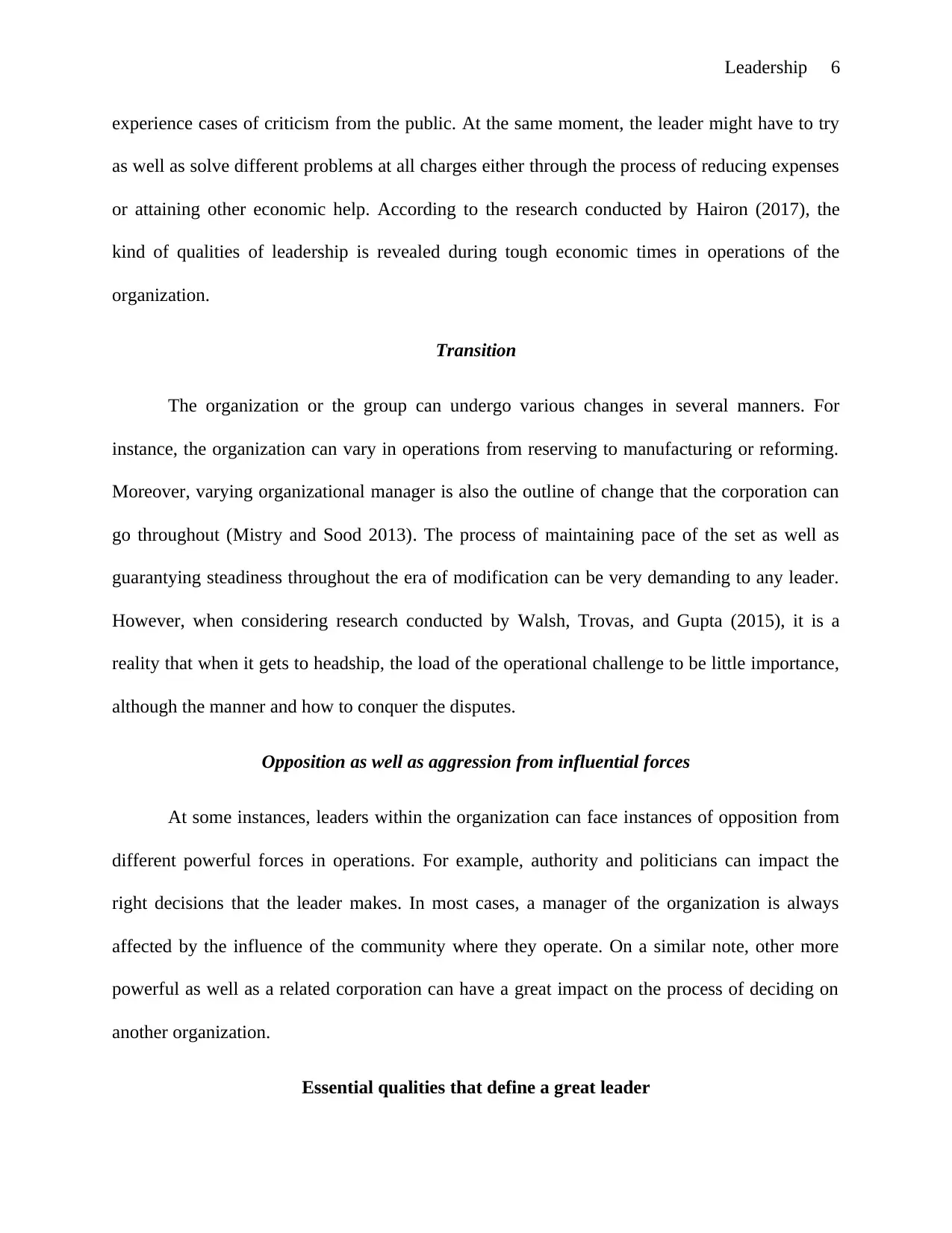
Leadership 6
experience cases of criticism from the public. At the same moment, the leader might have to try
as well as solve different problems at all charges either through the process of reducing expenses
or attaining other economic help. According to the research conducted by Hairon (2017), the
kind of qualities of leadership is revealed during tough economic times in operations of the
organization.
Transition
The organization or the group can undergo various changes in several manners. For
instance, the organization can vary in operations from reserving to manufacturing or reforming.
Moreover, varying organizational manager is also the outline of change that the corporation can
go throughout (Mistry and Sood 2013). The process of maintaining pace of the set as well as
guarantying steadiness throughout the era of modification can be very demanding to any leader.
However, when considering research conducted by Walsh, Trovas, and Gupta (2015), it is a
reality that when it gets to headship, the load of the operational challenge to be little importance,
although the manner and how to conquer the disputes.
Opposition as well as aggression from influential forces
At some instances, leaders within the organization can face instances of opposition from
different powerful forces in operations. For example, authority and politicians can impact the
right decisions that the leader makes. In most cases, a manager of the organization is always
affected by the influence of the community where they operate. On a similar note, other more
powerful as well as a related corporation can have a great impact on the process of deciding on
another organization.
Essential qualities that define a great leader
experience cases of criticism from the public. At the same moment, the leader might have to try
as well as solve different problems at all charges either through the process of reducing expenses
or attaining other economic help. According to the research conducted by Hairon (2017), the
kind of qualities of leadership is revealed during tough economic times in operations of the
organization.
Transition
The organization or the group can undergo various changes in several manners. For
instance, the organization can vary in operations from reserving to manufacturing or reforming.
Moreover, varying organizational manager is also the outline of change that the corporation can
go throughout (Mistry and Sood 2013). The process of maintaining pace of the set as well as
guarantying steadiness throughout the era of modification can be very demanding to any leader.
However, when considering research conducted by Walsh, Trovas, and Gupta (2015), it is a
reality that when it gets to headship, the load of the operational challenge to be little importance,
although the manner and how to conquer the disputes.
Opposition as well as aggression from influential forces
At some instances, leaders within the organization can face instances of opposition from
different powerful forces in operations. For example, authority and politicians can impact the
right decisions that the leader makes. In most cases, a manager of the organization is always
affected by the influence of the community where they operate. On a similar note, other more
powerful as well as a related corporation can have a great impact on the process of deciding on
another organization.
Essential qualities that define a great leader
⊘ This is a preview!⊘
Do you want full access?
Subscribe today to unlock all pages.

Trusted by 1+ million students worldwide
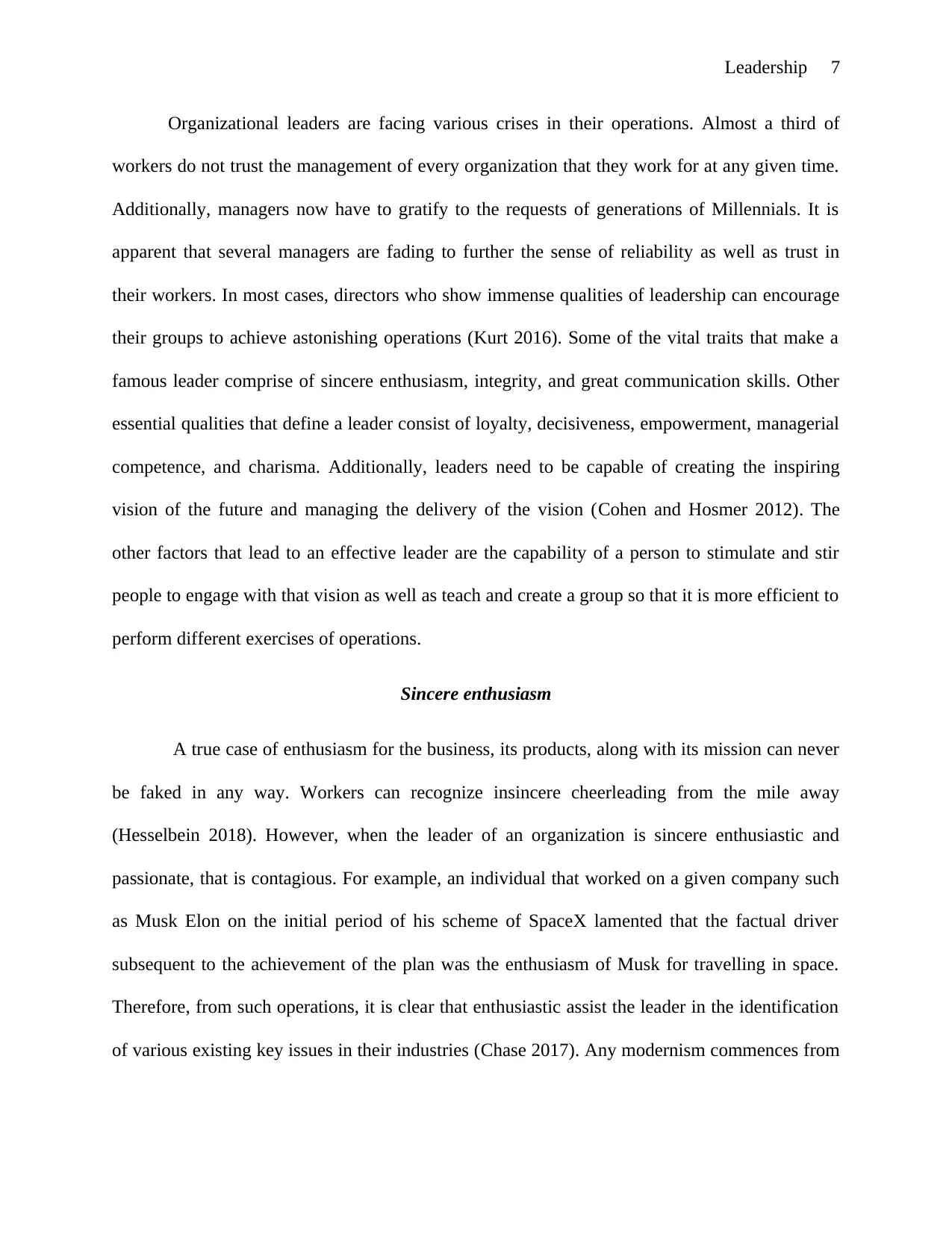
Leadership 7
Organizational leaders are facing various crises in their operations. Almost a third of
workers do not trust the management of every organization that they work for at any given time.
Additionally, managers now have to gratify to the requests of generations of Millennials. It is
apparent that several managers are fading to further the sense of reliability as well as trust in
their workers. In most cases, directors who show immense qualities of leadership can encourage
their groups to achieve astonishing operations (Kurt 2016). Some of the vital traits that make a
famous leader comprise of sincere enthusiasm, integrity, and great communication skills. Other
essential qualities that define a leader consist of loyalty, decisiveness, empowerment, managerial
competence, and charisma. Additionally, leaders need to be capable of creating the inspiring
vision of the future and managing the delivery of the vision (Cohen and Hosmer 2012). The
other factors that lead to an effective leader are the capability of a person to stimulate and stir
people to engage with that vision as well as teach and create a group so that it is more efficient to
perform different exercises of operations.
Sincere enthusiasm
A true case of enthusiasm for the business, its products, along with its mission can never
be faked in any way. Workers can recognize insincere cheerleading from the mile away
(Hesselbein 2018). However, when the leader of an organization is sincere enthusiastic and
passionate, that is contagious. For example, an individual that worked on a given company such
as Musk Elon on the initial period of his scheme of SpaceX lamented that the factual driver
subsequent to the achievement of the plan was the enthusiasm of Musk for travelling in space.
Therefore, from such operations, it is clear that enthusiastic assist the leader in the identification
of various existing key issues in their industries (Chase 2017). Any modernism commences from
Organizational leaders are facing various crises in their operations. Almost a third of
workers do not trust the management of every organization that they work for at any given time.
Additionally, managers now have to gratify to the requests of generations of Millennials. It is
apparent that several managers are fading to further the sense of reliability as well as trust in
their workers. In most cases, directors who show immense qualities of leadership can encourage
their groups to achieve astonishing operations (Kurt 2016). Some of the vital traits that make a
famous leader comprise of sincere enthusiasm, integrity, and great communication skills. Other
essential qualities that define a leader consist of loyalty, decisiveness, empowerment, managerial
competence, and charisma. Additionally, leaders need to be capable of creating the inspiring
vision of the future and managing the delivery of the vision (Cohen and Hosmer 2012). The
other factors that lead to an effective leader are the capability of a person to stimulate and stir
people to engage with that vision as well as teach and create a group so that it is more efficient to
perform different exercises of operations.
Sincere enthusiasm
A true case of enthusiasm for the business, its products, along with its mission can never
be faked in any way. Workers can recognize insincere cheerleading from the mile away
(Hesselbein 2018). However, when the leader of an organization is sincere enthusiastic and
passionate, that is contagious. For example, an individual that worked on a given company such
as Musk Elon on the initial period of his scheme of SpaceX lamented that the factual driver
subsequent to the achievement of the plan was the enthusiasm of Musk for travelling in space.
Therefore, from such operations, it is clear that enthusiastic assist the leader in the identification
of various existing key issues in their industries (Chase 2017). Any modernism commences from
Paraphrase This Document
Need a fresh take? Get an instant paraphrase of this document with our AI Paraphraser
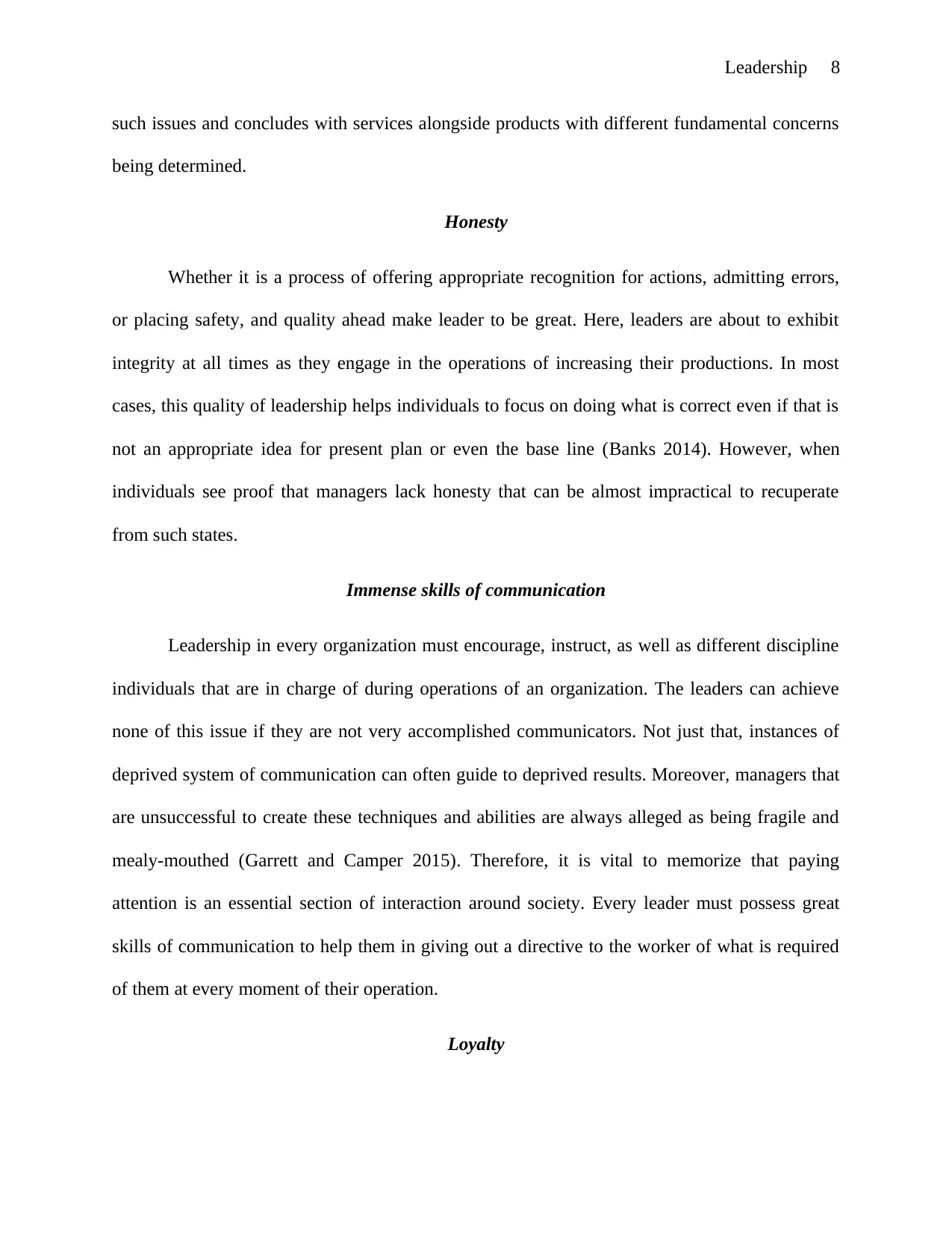
Leadership 8
such issues and concludes with services alongside products with different fundamental concerns
being determined.
Honesty
Whether it is a process of offering appropriate recognition for actions, admitting errors,
or placing safety, and quality ahead make leader to be great. Here, leaders are about to exhibit
integrity at all times as they engage in the operations of increasing their productions. In most
cases, this quality of leadership helps individuals to focus on doing what is correct even if that is
not an appropriate idea for present plan or even the base line (Banks 2014). However, when
individuals see proof that managers lack honesty that can be almost impractical to recuperate
from such states.
Immense skills of communication
Leadership in every organization must encourage, instruct, as well as different discipline
individuals that are in charge of during operations of an organization. The leaders can achieve
none of this issue if they are not very accomplished communicators. Not just that, instances of
deprived system of communication can often guide to deprived results. Moreover, managers that
are unsuccessful to create these techniques and abilities are always alleged as being fragile and
mealy-mouthed (Garrett and Camper 2015). Therefore, it is vital to memorize that paying
attention is an essential section of interaction around society. Every leader must possess great
skills of communication to help them in giving out a directive to the worker of what is required
of them at every moment of their operation.
Loyalty
such issues and concludes with services alongside products with different fundamental concerns
being determined.
Honesty
Whether it is a process of offering appropriate recognition for actions, admitting errors,
or placing safety, and quality ahead make leader to be great. Here, leaders are about to exhibit
integrity at all times as they engage in the operations of increasing their productions. In most
cases, this quality of leadership helps individuals to focus on doing what is correct even if that is
not an appropriate idea for present plan or even the base line (Banks 2014). However, when
individuals see proof that managers lack honesty that can be almost impractical to recuperate
from such states.
Immense skills of communication
Leadership in every organization must encourage, instruct, as well as different discipline
individuals that are in charge of during operations of an organization. The leaders can achieve
none of this issue if they are not very accomplished communicators. Not just that, instances of
deprived system of communication can often guide to deprived results. Moreover, managers that
are unsuccessful to create these techniques and abilities are always alleged as being fragile and
mealy-mouthed (Garrett and Camper 2015). Therefore, it is vital to memorize that paying
attention is an essential section of interaction around society. Every leader must possess great
skills of communication to help them in giving out a directive to the worker of what is required
of them at every moment of their operation.
Loyalty
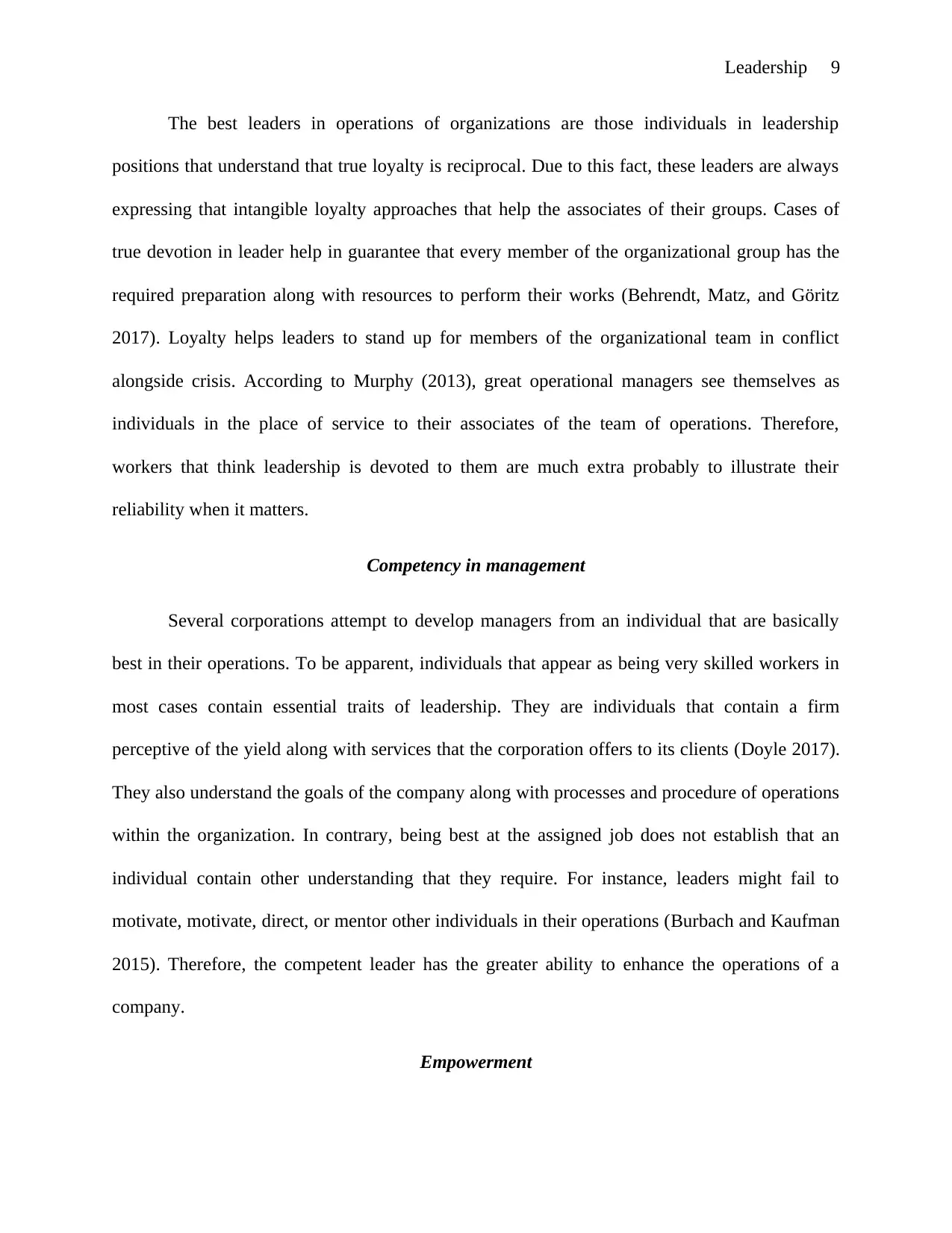
Leadership 9
The best leaders in operations of organizations are those individuals in leadership
positions that understand that true loyalty is reciprocal. Due to this fact, these leaders are always
expressing that intangible loyalty approaches that help the associates of their groups. Cases of
true devotion in leader help in guarantee that every member of the organizational group has the
required preparation along with resources to perform their works (Behrendt, Matz, and Göritz
2017). Loyalty helps leaders to stand up for members of the organizational team in conflict
alongside crisis. According to Murphy (2013), great operational managers see themselves as
individuals in the place of service to their associates of the team of operations. Therefore,
workers that think leadership is devoted to them are much extra probably to illustrate their
reliability when it matters.
Competency in management
Several corporations attempt to develop managers from an individual that are basically
best in their operations. To be apparent, individuals that appear as being very skilled workers in
most cases contain essential traits of leadership. They are individuals that contain a firm
perceptive of the yield along with services that the corporation offers to its clients (Doyle 2017).
They also understand the goals of the company along with processes and procedure of operations
within the organization. In contrary, being best at the assigned job does not establish that an
individual contain other understanding that they require. For instance, leaders might fail to
motivate, motivate, direct, or mentor other individuals in their operations (Burbach and Kaufman
2015). Therefore, the competent leader has the greater ability to enhance the operations of a
company.
Empowerment
The best leaders in operations of organizations are those individuals in leadership
positions that understand that true loyalty is reciprocal. Due to this fact, these leaders are always
expressing that intangible loyalty approaches that help the associates of their groups. Cases of
true devotion in leader help in guarantee that every member of the organizational group has the
required preparation along with resources to perform their works (Behrendt, Matz, and Göritz
2017). Loyalty helps leaders to stand up for members of the organizational team in conflict
alongside crisis. According to Murphy (2013), great operational managers see themselves as
individuals in the place of service to their associates of the team of operations. Therefore,
workers that think leadership is devoted to them are much extra probably to illustrate their
reliability when it matters.
Competency in management
Several corporations attempt to develop managers from an individual that are basically
best in their operations. To be apparent, individuals that appear as being very skilled workers in
most cases contain essential traits of leadership. They are individuals that contain a firm
perceptive of the yield along with services that the corporation offers to its clients (Doyle 2017).
They also understand the goals of the company along with processes and procedure of operations
within the organization. In contrary, being best at the assigned job does not establish that an
individual contain other understanding that they require. For instance, leaders might fail to
motivate, motivate, direct, or mentor other individuals in their operations (Burbach and Kaufman
2015). Therefore, the competent leader has the greater ability to enhance the operations of a
company.
Empowerment
⊘ This is a preview!⊘
Do you want full access?
Subscribe today to unlock all pages.

Trusted by 1+ million students worldwide
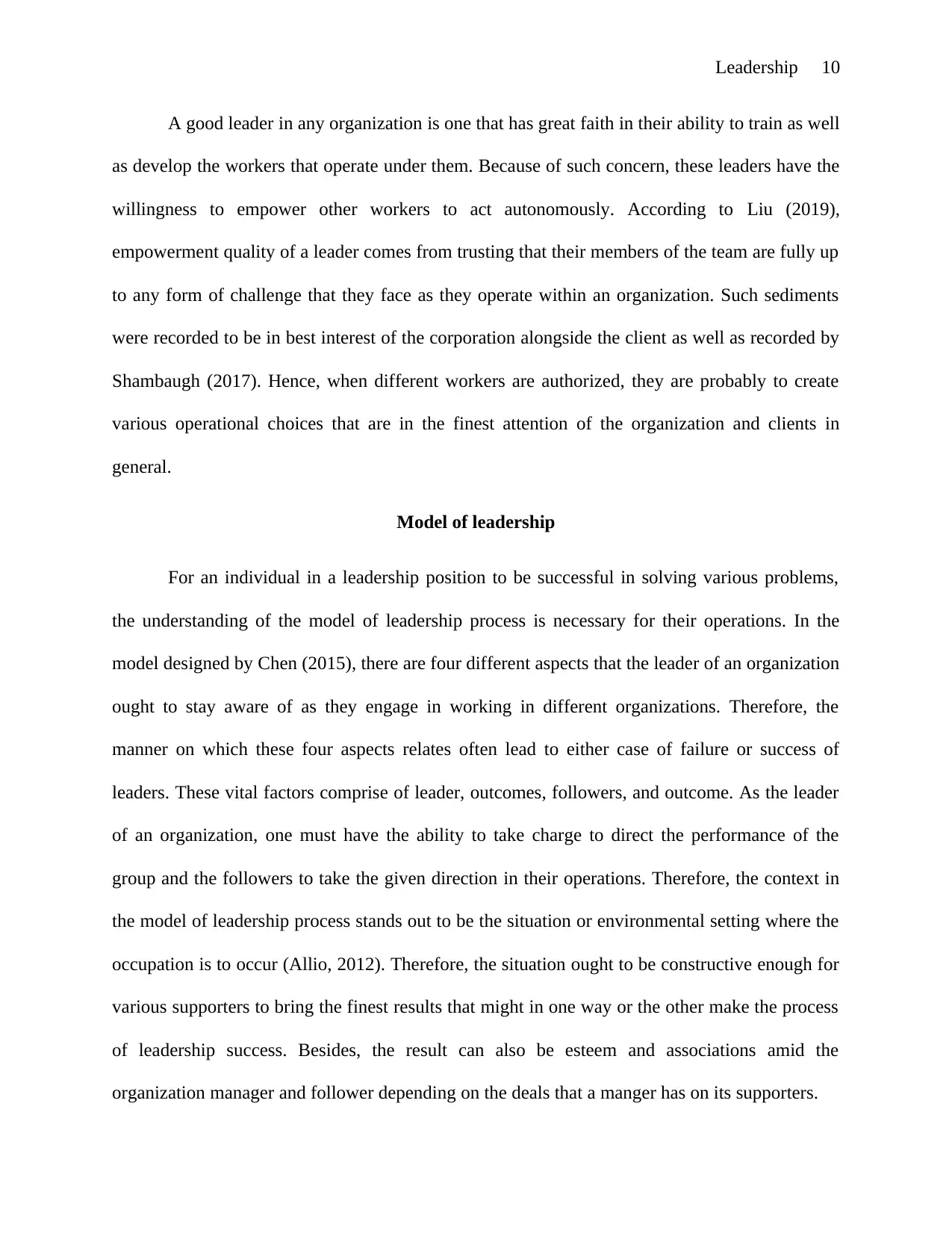
Leadership 10
A good leader in any organization is one that has great faith in their ability to train as well
as develop the workers that operate under them. Because of such concern, these leaders have the
willingness to empower other workers to act autonomously. According to Liu (2019),
empowerment quality of a leader comes from trusting that their members of the team are fully up
to any form of challenge that they face as they operate within an organization. Such sediments
were recorded to be in best interest of the corporation alongside the client as well as recorded by
Shambaugh (2017). Hence, when different workers are authorized, they are probably to create
various operational choices that are in the finest attention of the organization and clients in
general.
Model of leadership
For an individual in a leadership position to be successful in solving various problems,
the understanding of the model of leadership process is necessary for their operations. In the
model designed by Chen (2015), there are four different aspects that the leader of an organization
ought to stay aware of as they engage in working in different organizations. Therefore, the
manner on which these four aspects relates often lead to either case of failure or success of
leaders. These vital factors comprise of leader, outcomes, followers, and outcome. As the leader
of an organization, one must have the ability to take charge to direct the performance of the
group and the followers to take the given direction in their operations. Therefore, the context in
the model of leadership process stands out to be the situation or environmental setting where the
occupation is to occur (Allio, 2012). Therefore, the situation ought to be constructive enough for
various supporters to bring the finest results that might in one way or the other make the process
of leadership success. Besides, the result can also be esteem and associations amid the
organization manager and follower depending on the deals that a manger has on its supporters.
A good leader in any organization is one that has great faith in their ability to train as well
as develop the workers that operate under them. Because of such concern, these leaders have the
willingness to empower other workers to act autonomously. According to Liu (2019),
empowerment quality of a leader comes from trusting that their members of the team are fully up
to any form of challenge that they face as they operate within an organization. Such sediments
were recorded to be in best interest of the corporation alongside the client as well as recorded by
Shambaugh (2017). Hence, when different workers are authorized, they are probably to create
various operational choices that are in the finest attention of the organization and clients in
general.
Model of leadership
For an individual in a leadership position to be successful in solving various problems,
the understanding of the model of leadership process is necessary for their operations. In the
model designed by Chen (2015), there are four different aspects that the leader of an organization
ought to stay aware of as they engage in working in different organizations. Therefore, the
manner on which these four aspects relates often lead to either case of failure or success of
leaders. These vital factors comprise of leader, outcomes, followers, and outcome. As the leader
of an organization, one must have the ability to take charge to direct the performance of the
group and the followers to take the given direction in their operations. Therefore, the context in
the model of leadership process stands out to be the situation or environmental setting where the
occupation is to occur (Allio, 2012). Therefore, the situation ought to be constructive enough for
various supporters to bring the finest results that might in one way or the other make the process
of leadership success. Besides, the result can also be esteem and associations amid the
organization manager and follower depending on the deals that a manger has on its supporters.
Paraphrase This Document
Need a fresh take? Get an instant paraphrase of this document with our AI Paraphraser
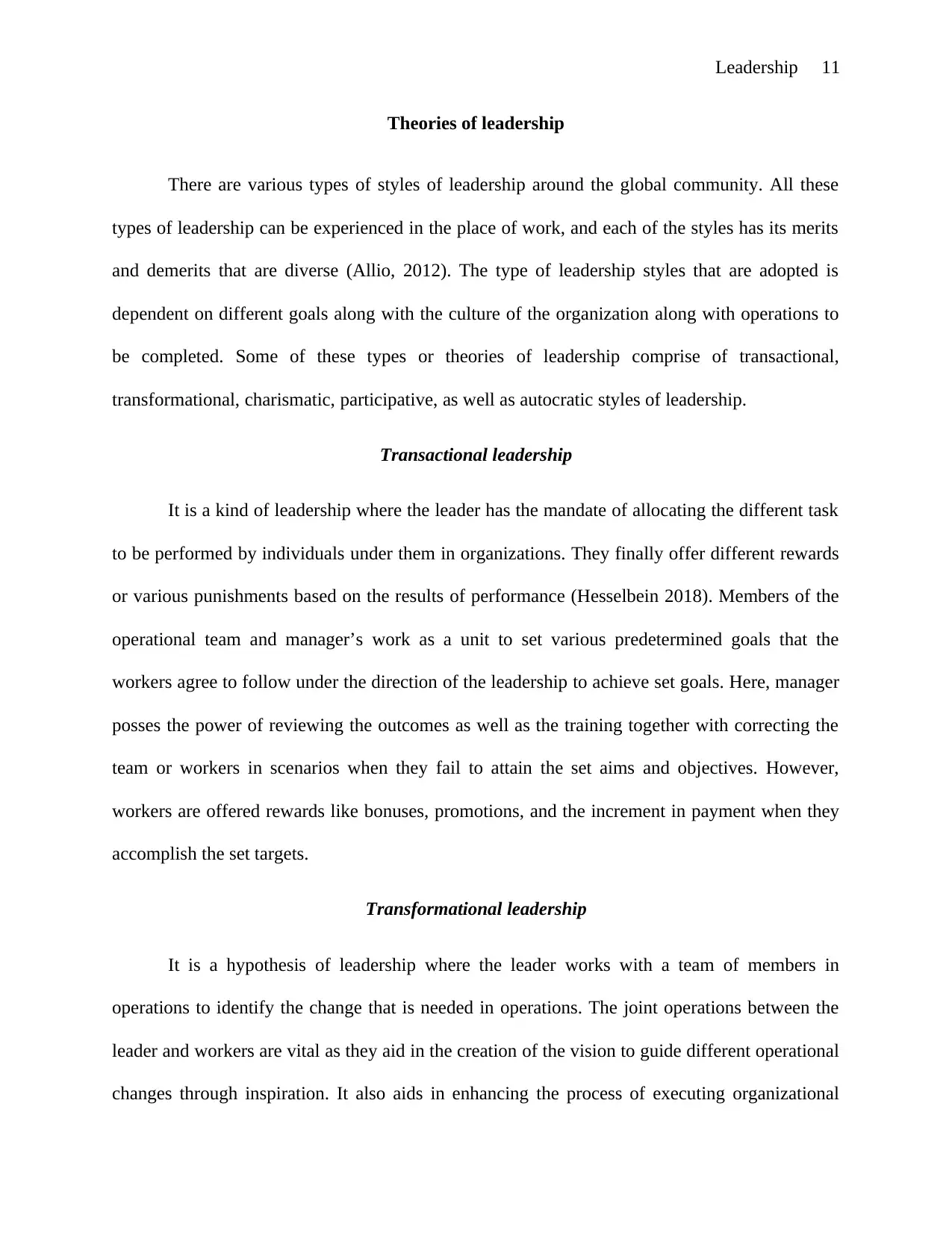
Leadership 11
Theories of leadership
There are various types of styles of leadership around the global community. All these
types of leadership can be experienced in the place of work, and each of the styles has its merits
and demerits that are diverse (Allio, 2012). The type of leadership styles that are adopted is
dependent on different goals along with the culture of the organization along with operations to
be completed. Some of these types or theories of leadership comprise of transactional,
transformational, charismatic, participative, as well as autocratic styles of leadership.
Transactional leadership
It is a kind of leadership where the leader has the mandate of allocating the different task
to be performed by individuals under them in organizations. They finally offer different rewards
or various punishments based on the results of performance (Hesselbein 2018). Members of the
operational team and manager’s work as a unit to set various predetermined goals that the
workers agree to follow under the direction of the leadership to achieve set goals. Here, manager
posses the power of reviewing the outcomes as well as the training together with correcting the
team or workers in scenarios when they fail to attain the set aims and objectives. However,
workers are offered rewards like bonuses, promotions, and the increment in payment when they
accomplish the set targets.
Transformational leadership
It is a hypothesis of leadership where the leader works with a team of members in
operations to identify the change that is needed in operations. The joint operations between the
leader and workers are vital as they aid in the creation of the vision to guide different operational
changes through inspiration. It also aids in enhancing the process of executing organizational
Theories of leadership
There are various types of styles of leadership around the global community. All these
types of leadership can be experienced in the place of work, and each of the styles has its merits
and demerits that are diverse (Allio, 2012). The type of leadership styles that are adopted is
dependent on different goals along with the culture of the organization along with operations to
be completed. Some of these types or theories of leadership comprise of transactional,
transformational, charismatic, participative, as well as autocratic styles of leadership.
Transactional leadership
It is a kind of leadership where the leader has the mandate of allocating the different task
to be performed by individuals under them in organizations. They finally offer different rewards
or various punishments based on the results of performance (Hesselbein 2018). Members of the
operational team and manager’s work as a unit to set various predetermined goals that the
workers agree to follow under the direction of the leadership to achieve set goals. Here, manager
posses the power of reviewing the outcomes as well as the training together with correcting the
team or workers in scenarios when they fail to attain the set aims and objectives. However,
workers are offered rewards like bonuses, promotions, and the increment in payment when they
accomplish the set targets.
Transformational leadership
It is a hypothesis of leadership where the leader works with a team of members in
operations to identify the change that is needed in operations. The joint operations between the
leader and workers are vital as they aid in the creation of the vision to guide different operational
changes through inspiration. It also aids in enhancing the process of executing organizational
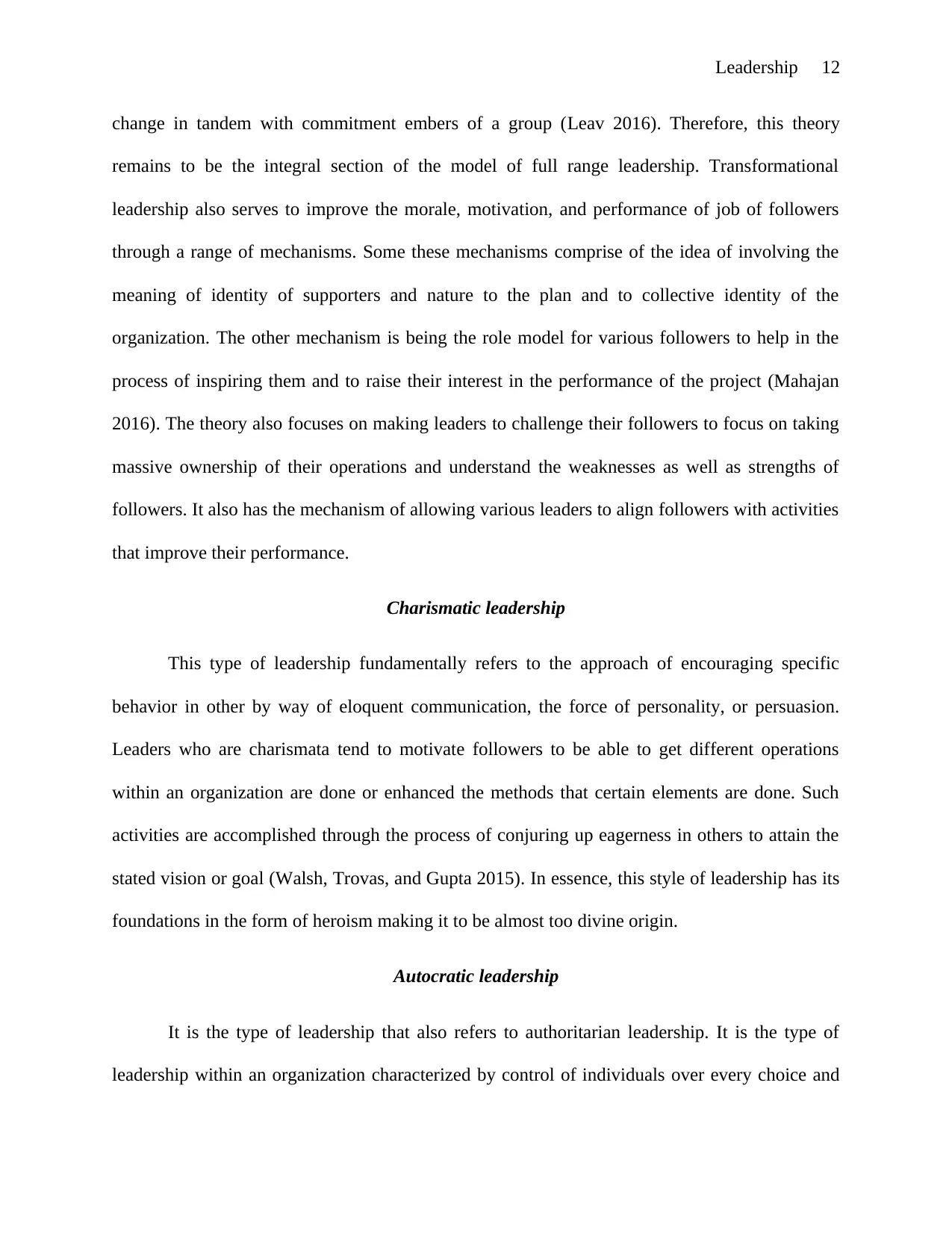
Leadership 12
change in tandem with commitment embers of a group (Leav 2016). Therefore, this theory
remains to be the integral section of the model of full range leadership. Transformational
leadership also serves to improve the morale, motivation, and performance of job of followers
through a range of mechanisms. Some these mechanisms comprise of the idea of involving the
meaning of identity of supporters and nature to the plan and to collective identity of the
organization. The other mechanism is being the role model for various followers to help in the
process of inspiring them and to raise their interest in the performance of the project (Mahajan
2016). The theory also focuses on making leaders to challenge their followers to focus on taking
massive ownership of their operations and understand the weaknesses as well as strengths of
followers. It also has the mechanism of allowing various leaders to align followers with activities
that improve their performance.
Charismatic leadership
This type of leadership fundamentally refers to the approach of encouraging specific
behavior in other by way of eloquent communication, the force of personality, or persuasion.
Leaders who are charismata tend to motivate followers to be able to get different operations
within an organization are done or enhanced the methods that certain elements are done. Such
activities are accomplished through the process of conjuring up eagerness in others to attain the
stated vision or goal (Walsh, Trovas, and Gupta 2015). In essence, this style of leadership has its
foundations in the form of heroism making it to be almost too divine origin.
Autocratic leadership
It is the type of leadership that also refers to authoritarian leadership. It is the type of
leadership within an organization characterized by control of individuals over every choice and
change in tandem with commitment embers of a group (Leav 2016). Therefore, this theory
remains to be the integral section of the model of full range leadership. Transformational
leadership also serves to improve the morale, motivation, and performance of job of followers
through a range of mechanisms. Some these mechanisms comprise of the idea of involving the
meaning of identity of supporters and nature to the plan and to collective identity of the
organization. The other mechanism is being the role model for various followers to help in the
process of inspiring them and to raise their interest in the performance of the project (Mahajan
2016). The theory also focuses on making leaders to challenge their followers to focus on taking
massive ownership of their operations and understand the weaknesses as well as strengths of
followers. It also has the mechanism of allowing various leaders to align followers with activities
that improve their performance.
Charismatic leadership
This type of leadership fundamentally refers to the approach of encouraging specific
behavior in other by way of eloquent communication, the force of personality, or persuasion.
Leaders who are charismata tend to motivate followers to be able to get different operations
within an organization are done or enhanced the methods that certain elements are done. Such
activities are accomplished through the process of conjuring up eagerness in others to attain the
stated vision or goal (Walsh, Trovas, and Gupta 2015). In essence, this style of leadership has its
foundations in the form of heroism making it to be almost too divine origin.
Autocratic leadership
It is the type of leadership that also refers to authoritarian leadership. It is the type of
leadership within an organization characterized by control of individuals over every choice and
⊘ This is a preview!⊘
Do you want full access?
Subscribe today to unlock all pages.

Trusted by 1+ million students worldwide
1 out of 18
Related Documents
Your All-in-One AI-Powered Toolkit for Academic Success.
+13062052269
info@desklib.com
Available 24*7 on WhatsApp / Email
![[object Object]](/_next/static/media/star-bottom.7253800d.svg)
Unlock your academic potential
Copyright © 2020–2026 A2Z Services. All Rights Reserved. Developed and managed by ZUCOL.





